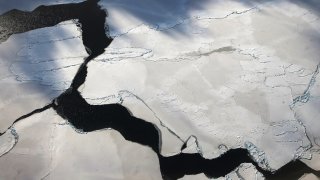
Contrary to a commonly feared scenario, melting Arctic permafrost does not release enough greenhouse gas to accelerate global warming, according to a newly released study that began by a UC San Diego geoscientist more than 20 years ago.
Jeff Severinghaus, a geoscientist at Scripps Institution of Oceanography at UC San Diego, joined a research team led by the University of Rochester to analyze samples of gases trapped in ice during a period of deglaciation between 18,000 and 8,000 years ago, according to Scripps. The period is considered to have some sort of relation to the current era of global warming.
The team drilled and collected ice cores from the Taylor Glacier in Antarctica for their research. Each core contained bubbles with small bits of ancient air inside.
Researchers discovered that the methane released from the particles reached the atmosphere in very little quantities. The scientists believe methane-eating microbes on the top few inches of soil on permafrost prevents gas from reaching the atmosphere.
In a separate study, however, the team determined that human-made fossil fuel methane emissions have been severely underestimated. They warn that the public should be more concerned about methane being released from human activities.

